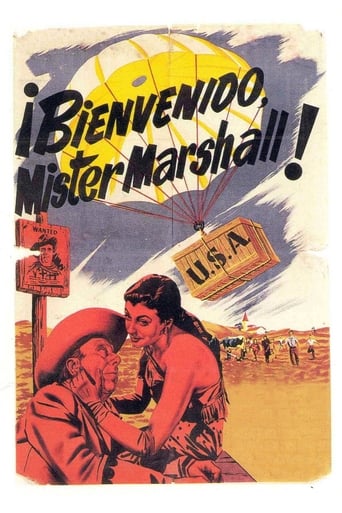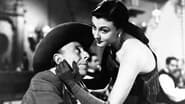runamokprods
Gentle, sometimes very funny political satire, somewhat reminiscent of the UK Ealing Studio films. The poor, small Spanish town of Villar del Rio is abuzz with the news that American officials are coming to visit, and plan to show off their best face in an effort to get their slice of the Marshall Plan pie. (Spain was actually excluded from the funds). While sometimes predictable, and sometimes badly post dubbed this is a fun film with just enough edge to look at the darker side of human nature, but with a smile.Frustratingly this classic of Spanish cinema isn't available on US DVD. I had to order mine from Amazon Spain (although it has US subtitles, and looks pretty good.)
Rueiro
This is one of those little films that never stand out of the crowd but have a big value on their own and remain a a much-loved B-series national treasure. If you are not familiarised with Spanish cinema that is not Almodovar's, just think of the classic Ealing comedies in Britain, and that may give you an idea as to what this film is about: a bunch of good-natured and eccentric characters in a God-forsaken little community where nothing ever happens, and then when something eventually happens it causes havoc and turns everything upside down with very funny consequences... "Welcome Mr Marshall" is also a faithful document on rural Spain in the early 1950s, when the country, ruled by a fascist regime, was just coming out from a long period of international isolation after World War II and beginning to be accepted by the western powers as a convenient ally against the eastern block during the Cold War. That is precisely what this film is about: in 1950 Uncle Sam arrives in Spain with the Marshall Plan for post-war economic recovery, and the picture the local authorities present to the simple folk is that of a bunch of gold-loaded Yankee businessmen coming in to give away cash and all sorts of things imaginable, just like the Three Wise Men who came to the baby Jesus.... Eventually the Yanks come, indeed, but they are too much in a hurry as to stop by, so they just drive past the village, leaving the locals as empty-handed as they were before... If you like social comedies such as "The Quiet Man", "The Titfield Thunderbolt" or "Local Hero", you surely will love this one if you can understand what is going on. Take my word for it.
Hedgehog_Carnival
Widely regarded (at least among older generations of Spaniards) as Spain's best ever film, this is first and foremost a comedy of rural manners that still, fifty years on, succeeds in its primary objective of making the audience laugh (show this to any Spanish-speaking audience in the world and you'll get giggles throughout. Beware, though, some of the humour is untranslatable or at least unsubtitleable.) On another level, it's a clever, ironic commentary upon the predicament of fifties Spain, isolated from the rest of the world not only politically but in pretty much every other respect too.The film kicks off with an extended voice-over introduction in which a narrator introduces us to a village and its main characters, playfully exploiting the odd camera trick (freeze-frames, emptying a scene of people) and establishing a tone of gentle, affectionate irony towards the inhabitants. This offscreen narrator returns regularly through the film and the tone of the narration crucially defines how we respond to what we see on screen. The characters include the mayor (a shrewd old man suffering from intermittent deafness), a benign local priest, an "hidalgo" (soi-disant member of the nobility, obsessed with his ancestral heritage), a young, pretty schoolmistress, and a few others; there are also two important visitors, an Andalusian songstress and her jovial, sharp-witted agent.The action of the film consists of the following (spoiler). News reaches the village that "the Americans are coming" in order to implement the Marshall plan, which is interpreted as the handing out of gifts to all the villagers. After a public meeting in which the schoolmistress and the priest between them attempt to define America to the villagers' satisfaction, the mayor teams up with the singer' agent to ensure the village puts on a good show to impress the visiting dignitaries, mainly by dressing itself up as a kind of folksy Andalusian village complete with guitar strummers and false building facades. Villagers queue up to have their individual requests recorded in advance (one item only). Finally, the Americans do arrive, but the visit consists of a cavalcade of fast cars that simply sweep through without stopping. (The last car has the word "Goodbye", in English, prominently displayed.) The villagers realise they have to pay for all the expense incurred in what turns out to have been a wasted show, but are not too unhappy: they take the disappointment stoically as "just one of those things".As already mentioned, what carries the story is a combination of the gentle, affectionate tone of the narration, together with almost unstoppable wry humour, both verbal and visual, and sometimes quite subtle (the narrator asserts that the schoolmistress' arithmetic is beyond reproach: later, we notice some wrong adding up on the blackboard). The acting is first rate, the camera work slick, and all in all, if this isn't still Spain's best film it certainly deserves a place in the top three.
fourva
I have seen this film in its original version and in a French translation, and I must admit that, as far as all cinematic qualities are concerned, it reminds me very much of those glorious British Ealing Studios comedies of the 50s.




